#Warsaw to Moscow
Explore tagged Tumblr posts
Text
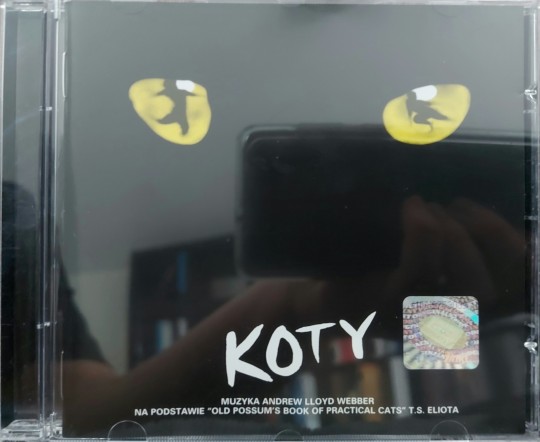
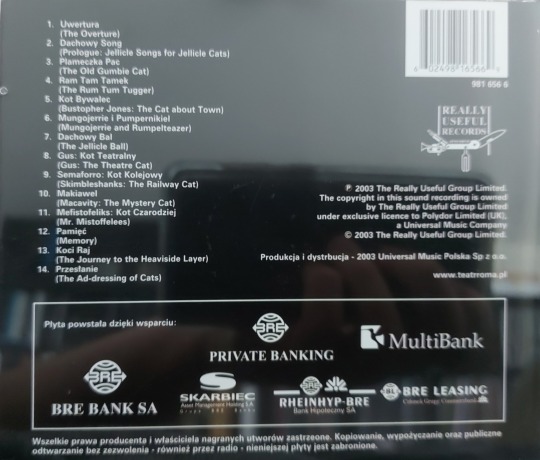



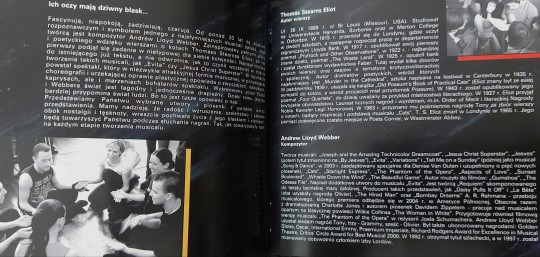
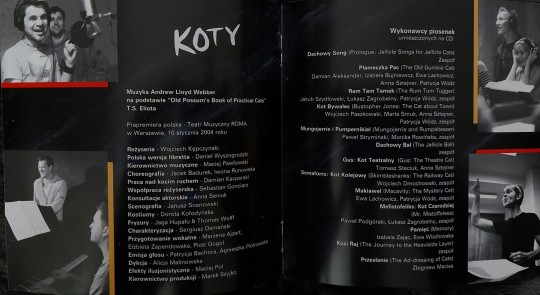
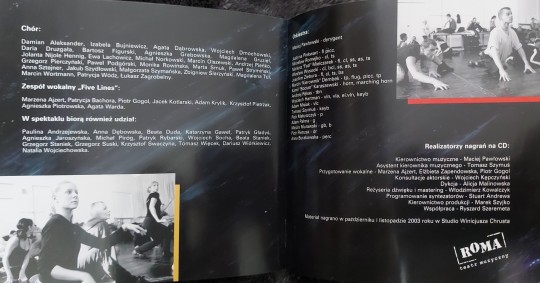
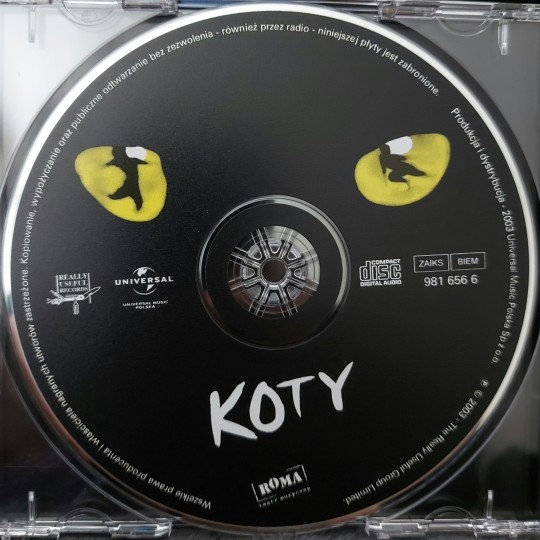
The 2004 cast recording for the Warsaw non-replica of CATS. As with most cast recordings, this one is highlights of the show.
There are a few photos of the rehearsals for the production in the booklet, along with cast and creative team credits.
I admittedly have not given this a listen yet, but it is great that a production like Warsaw had the opportunity to release a cast recording, especially it being a non-replica.
Now if I could only find the Versione Italiana CD easily.
#CATS Musical#CATS the Musical#CATS Warsaw 2004#Merchandiscial CATS#Beyond a few promotional CDs for Moscow and Madrid#And the elusive Italian Cast recording#There are not many cast recordings I do not own in some form
20 notes
·
View notes
Text


Will Ukrainians now be classified as "people of color"?
#ukraine#ukrainian#russian#russia#poland#slavic#eastern europe#europe#lithuania#czech#czech republic#czechia#warsaw#poles#moscow#vp harris#vp kamala harris#kamala harris#trump train#donald trump#trump 2024#trump
3 notes
·
View notes
Text
Putin didn’t have a very victorious Victory Day.
Instead of Victory Day being the usual annual display of Russian power, Russia’s military in Red Square on Tuesday looked particularly flaccid.
Analysis: Moscow's parade, intended to flaunt strength, instead reveals weakness
One tank. Some very young soldiers. And a distinctly warped message.
The display on Red Square for May 9, for decades a moment when Russia’s staggering sacrifice in the Great Patriotic War was sombrely honored, rang hollow. In 2023, it became a backdrop for the Kremlin head’s poor decision-making.
[ ... ]
The substance of the parade itself was also telling. There was only one tank: a T-34, a model made 89 years ago, before Putin was even born, raising the question of why they decided to include any tanks at all.
The level of hardware on display seemed thin: understandable perhaps for a military being mauled on a wide and relentless frontline. But again, it raises the enduring bind for the Kremlin.
They keep having to prove their strength, their might, yet have little actual might left to do it with. The exercise ends up being one of revealing weakness.
No jets flew by. The Kremlin itself had — according to its own press release — come under drone attack just days earlier. All incompatible with Putin’s unique sales point — that under him Russia is impregnable and respected again.
[ ... ]
Ukraine's air defense has proven potent — and Moscow less so.
It raises again the long-term question of this war: Is a weak Russia dangerous or just weak?
So here’s the only tank in Putin’s parade. It looks like it was borrowed from a museum.

Here’s why Putin’s parade had just one ancient tank and no jets.

And it wasn’t only Moscow where Putin’s Victory Day didn’t go well. Russia’s ambassador to Poland was faced with an installation marking Russian war crimes in Ukraine.
Ukraine flags block Russian ambassador’s path on Victory Day
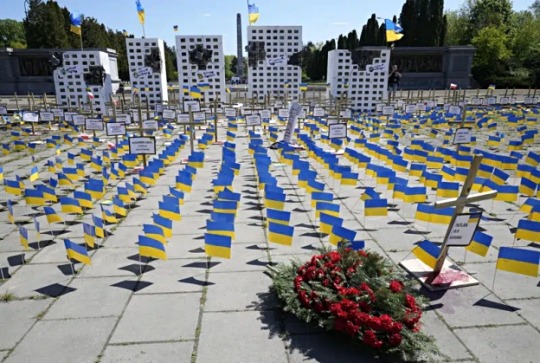
#invasion of ukraine#russia#victory day#victory day parade#t-34#no jets#vladimir putin#moscow#red square#warsaw#euromaidan-warszawa#viktoria pogrebniak#россия#день победы#красная площадь#владимир путин#путин хуйло#россия проигрывает войну#варшава#военные преступления#путин – это лжедмитрий iv а не пётр великий#нет убийцам#ге��ь з україни#вторгнення оркостану в україну#україна переможе#слава україні!#героям слава!
12 notes
·
View notes
Text
Die Ravioli für das Po-log-in per Nase in der 'fruchtigen' Bologneser (Tomaten)-Sauce des selbst Italieners fein-würzigen von erst heute morgen, herstammen aber tat sie erkennbar auch hier nur wieder von der sogar wieder auch englischen Maggy! (Maggi). Erstanden erst heute morgen noch in aller Frühe bei selbst: "Kauf-(dir-versuchsweise-gleich-ein-gesamtes)-Land!!"
'Hier bei uns seid ihr (gold-)richtig!!!'
Anschließend der erneute Sekunden- oder Minuten-Schlaf deswegen im nahen Kaufpark von mir auf einer der dortigen Sitzbänke für Besucher gedachte! Ein (nicht-deutscher) Sicherheitsmann verwies mich dann in ihm der Türe! Wenn, solle ich draußen meinen Schlaf fortsetzen!
Er muss geglaubt haben, in ihm wäre mein Aufenthalt um sehr vieles sicherer!
*besonders goldgelbe französische Po(h)ommes für den Fritz aus Deutschland *Erbsensuppe mit Bauchspeck (vermutlich deutschem) und aus Männerschwänzen gefertigten Würsten oder (Bio)-Würstchen (some cock-tails). *der (geplante) jock hurt für den Er-bären 'mit 11 % Fruchtanteil'. Bio-/der boy aus England. Schwedische Bio-Tomaten. Gemeint sein damit aber duerfte der obere Teil dann von ihm nur wieder, und auch hier! Wegen sogar auch der: 'jockspitze' als auch noch weiterem Begriff nur'. die 'Er(d)-beere, deren oberere Spitze'. Männer.
Röhm war angeblich schwul oder soll es gewesen sein!
(so ein Zeitungskommentar jüngerer der Hannoverschen Presse)
Und dennoch ist es wahrscheinlich, bezichtigten schon auch die damals regierenden Nationalsozialisten mit ihrer Partei die Juden desselben Vergehens wiederholt wohl schon auch! Deren Männer sollten es zuhauf dann schon auch gewesen sein, unter Duldung der Frauen!
Ooh, He fights with missiles and with spears He's all of 31 and he's only 17 Been a soldier for a thousand year
He'a a Catholic, a Hindu, an Atheist, a Jain A Buddhist, and a Baptist, and a Jew
(aus dem Text von: The Universal soldier by the english folk singer Donovan, 60er Jahre)
And he knows he shouldn't kill And yet he knows that even he must and always will. Kill you becus' of me, my friend, and me becus' for you!!!
He's fighting for Canada just like he's fighting for France. He's fighting for even the U.S.A! Might be tomorrow he's fighting for even the Russians like - the day after tomorrow! - he is fighting for also Japan.
And he's fighting for Democracy He's fighting for the Reds He says it's for the final peace of just 'em all!!!
Ooh,
He's the one who must decide Who's to live and who's to die (for tomorrow)!
And without him How would Hitler have condemned them at Dachau?
Without him even Caesar would have fully stood alone He's the one who gives his body as some weapon to the war Without him all this killing can't go on!!
His orders come from here and there, by you and me. And brothers, can't you see: This aint' the way we all put some end to war!!!
the peace or best pieces (exclusively do belong men). Italian Pizza. Frieden halten! (dt.). die/eine sick-Er-is-(Might be!) hiding-Sammel-Verwahrung schlicht sie aller. In auch oder sogar konzentrierter Form!
Selber schlief ich zuletzt fast ausschließlich nur noch unter nächtlichem Polizeischutz so in und bei Hannover! Indem ich schlicht erneut darum bat!
*Ich tat es einfach schon deswegen dann erneut, weil selbst ich gerade wieder erst vielleicht eine erneute Pizza mitsamt Ass-Arlarmi vielleicht gegessen hatte, ein weiteres Mal aus Italien kommend, und mir sogar Privat-Leute gelegentlich erneut auch zu folgen schienen seitdem!
#Gasduschen#Sicherheitsverwahrungen in Sammellagern#Dem Stadion von Braunschweig fehlen massiv die Fussballfans früheren deutschen#Bundeswehr schrumpft auf 180.000 Soldaten (von ehemals 500.000)#Konzentrationslager für ausschließlich Polen#Warsaw-Berlin#Kiew-Moscow#gegenwärtiger Palestine-Israel-Konflikt#arab jews#gegenseitige Angriffe#Luftbombardements von Städten des jeweils anderen
0 notes
Text
The choice of setting continues to be…A Choice following last week’s events
1 note
·
View note
Text
D 245 Aachen – Brest with Polish sleeping car at departure station Aachen. This train is waiting for D 1213 which carries direct cars from Oostende to Hanover, Berlin, Warsaw and Moscow. Aachen (21.58) – Köln – Düsseldorf – Essen – Dortmund – Hanover – Helmstedt (3.44/54) – Marienborn – Berlin Stadtbahn – Frankfurt (Oder) – Kunowice – Poznan – Warszawa – Terespol – Brest (23.28 MZ) WLABm 255 Aachen – Berlin DSG Bcm 256 Aachen – Berlin DR ABvm 257 Aachen – Berlin DR Bvm 258 Aachen – Berlin DR Ds Aachen – Berlin DR Bvm 259 Aachen – Berlin DR Bvm 260/660 Aachen – Berlin DR WLABm 253 Aachen - Rzepin (- Warszawa) PKP/WARS WLABm 135 (Oostende - ) Aachen - Brest (- Moskva) SŽD AB 136 (Oostende - ) Aachen - Rzepin (- Warszawa) B Bcm 134 (Oostende - ) Aachen - Berlin DR B 133 (Oostende - ) Aachen - Hannover B

#railway#railroad#eisenbahn#sleeping car#schlafwagen#aachen#berlin#warsaw#warszawa#warschau#moskau#moscow#москва#D 245#B#DR#DSG#PKP#WARS#SŽD#train#history
10 notes
·
View notes
Video
youtube
Poland's Ambassador Summoned To Moscow. #poland #warsaw #ukraine #kyiv #...
#youtube#Poland's Ambassador Summoned To Moscow. poland warsaw ukraine kyiv kherson border missiles army Poland's ambassador has been summoned to Mo
0 notes
Text
How Russian colonialism took the Western anti-imperialist Left for a ride
Blindness to Russian colonialism distorts Westerners’ view of the Ukraine war
"Fucking shit Russian car," my driver spat as a Lada sedan passed us on the highway from Georgia's capital of Tbilisi to Stepantsminda during my trip there in 2019, shortly after our long conversation touched on Russia's 2008 invasion of Georgia.
His momentary flash of anger was an eye-opening glimpse at the consequences of Russia's steadfast refusal to let go of the 14 nations whose independence following the 1991 collapse of the Soviet Union dictator Vladimir Putin infamously called "the greatest geopolitical catastrophe of the century" – not to mention the ethnic minorities still under Moscow's yoke – and its brutal punishment of Georgia and Ukraine for daring to seek a bright future outside of Russia's sunless orbit.
The full-scale invasion of Ukraine has cast a long-overdue spotlight on Russian imperialism and colonialism, yet many Westerners fail to grapple with how Russia's colonial legacy continues to this day and is part and parcel to its war against Ukraine and descent into fascism. Consequently, many end up whatabouting, excusing and even overtly sympathizing with an empire whose colonial practices mirror those of historical Western European empires in cruelty, chauvinism, thievery, exploitation, cultural erasure, racism and genocide and that is now ruthlessly attempting to conquer one of its neighbors.
Russia displayed that ruthlessness last week when it lobbed missiles at Odesa, damaging port and grain storage facilities as well as its historic center, a UNESCO World Heritage site.
"They're interested in lands and influence and a buffer zone between them and the West, in sea access – but not in people and not in culture," said Ukrainian Parliament adviser Yuliia Shaipova who, together with her husband, Aspen Institute NextGen Transatlantic Initiative member Artem Shaipov, was at home in Odesa after hiding in a nearby bomb shelter.
Yet, Westerners safe from bombardment like long-shot third-party presidential candidate Cornel West continue to accommodate Russia. In a July 13 interview with CNN's Kaitlan Collins, West called Russia's invasion "criminal" but insisted it was "provoked by the expansion of NATO" and is a "proxy war between the American Empire and the Russian Federation," adding Neville Chamberlain-esque icing on the appeasement cake by proposing Ukrainian territorial concessions to Russia.
The tell in West's remarks was calling the U.S. an empire but referring to Russia by its de jure name, implicitly erasing its imperial, colonial character. It's a common tendency among the segment of the left to which West belongs, one that Kazakhstan-born Pitzer College sociology professor Azamat Junisbai attributes to ignorance and a myopic, know-nothing focus on American imperialism to the exclusion of imperialism by other nations.
"They're kind of imperial about their anti-imperialism," Junisbai said. "There's something very provincial and strange about it where you literally do not know anything about what's happening beyond this one issue you care about."
While West and other leftists blame "NATO expansion" for provoking Russia, Junisbai compares NATO membership – which, after all, the former Warsaw Pact and Baltic countries all sought voluntarily – to a restraining order against an abusive partner.
"People don't recognize that there was an abusive relationship, that there was colonialism," he said, speculating that blindness to Russian colonialism could be due to a failure of Western education systems as well as Soviet propaganda and leftist valorization of the Soviet Union as a foe of Western imperialism. Another potential culprit is knee-jerk distrust toward American foreign policy popular among some leftists and alternative media that leads to a simplistic "the enemy of my enemy is my friend" worldview.
"People, I think, just get so wedded to their vision of themselves as fighting 'The Man,' fighting the power that they are blinded and taken for a ride by Russia, in this case serving as useful idiots," Junisbai said.
Both Yuliia and Artem Shaipov pointed the finger at academic studies of Russia in the West that view it through Moscow's imperial lens. The two have published articles advocating for a "decolonization" of Russia studies and greater attention to how veneration of the "great Russian culture" – such as the genocide- and conquest-glorifying literature of Mikhail Lermontov and Alexander Pushkin – has provided a conduit for Russian imperialist ideology to sneak into the Western mind.
"Part of the reason is that it's Western academia that kind of perpetuates this imperial understanding of our region that benefits Russia's imperial policies," Shaipov said, pointing to how Western academic institutions place Ukraine and other post-Soviet nations under Russia's geopolitical umbrella of "Eurasia." "It speaks volumes about the reasons why still many people in the West see Ukraine and other independent states as the sphere of influence of Russia."
The resulting sympathy for Russia's imperial worldview finds expression among Western academics, media personalities and activists who deny Ukrainians' agency in repeating the Kremlin conspiracy theory that Ukraine's 2014 Revolution of Dignity was a "U.S.-backed coup" – as if Ukrainians couldn't have removed outrageously corrupt Kremlin stooge Viktor Yanukovych from office after his security forces murdered over 100 peaceful protesters without foreigners pulling the strings – or characterize former communist nations' NATO membership as provoking Russia rather than protecting them from it.
And it's a mindset rooted in over 400 years of imperialism and colonialism that caused atrocities as horrific as those of Spain or Britain.
Russia's conquest of Siberia starting in the 1580s, for instance, included the enslavement of indigenous peoples whom it forced to pay tribute in the form of furs known as yasak on pain of death, resulting in starvation as people struggled to meet yasak quotas instead of feeding themselves in a system some historians have compared to Belgian King Leopold II's enslavement of the Congo. Russian Cossack gangs raped and murdered while Orthodox missionaries stamped out native religions and alcoholism and smallpox decimated local populations. Today, indigenous people in Siberia and the Russian Far East frequently live in poverty while Moscow strips their lands' rich natural resources to line the pockets of oligarchs and fuel the glitz of cities like Moscow and St. Petersburg, while their men disproportionately make up the cannon fodder that Russia sends to the Ukrainian front.
"If we take the Russia that is situated behind the Urals – the Central Asian part of Russia, the far East Asian parts of Russia, the [northernmost parts of Russia] – the cities are just being used for extractive purposes, so [the Russians] don't care even about their own people and minorities that are in Russia itself," Shaipova said, noting how nearly all of their enormous wealth goes to the Russian metropole. "So basically, take Norilsk or Irkutsk – those cities look like an atomic bomb has exploded there."
In the Caucasus, where Russia vied with the Ottoman and Persian empires for power, the Muslim Circassians, who had inhabited the area for millennia, resisted Russian domination. So in 1857, Tsar Alexander II ordered their expulsion to the Ottoman Empire under a proposal by Count Dmitri Milyutin, who said it would "cleanse the land of hostile elements" and open their farmland for Christian settlers. The result was the Circassian genocide in which nearly the entire Circassian population was killed or expelled to the Middle East, where most Circassians live today.
Junisbai's own life is a testament to Russia's thorough colonization of his country, which began in earnest in the 18th century after Russia conquered it. His mother tongue is Russian rather than Kazakh thanks to generations of Russification that made learning Russian essential to get ahead while casting indigenous languages by the wayside. That led to him being conditioned to look down on Kazakhs who could not speak Russian properly while growing up in Almaty, whose population during the Soviet era was about four-fifths Russian and had only two Kazakh-language schools in the early 1980s, while Kazakhs largely lived in rural areas. Meanwhile, his great-grandfather was a member of the Kazakh intelligentsia, for which the Soviets executed him at Omsk in 1935 during Stalin's purges. Consistent with Russia's pattern of extractive relationships with its colonies, Moscow picked Kazakhstan as the place to test nuclear weapons, Junisbai's mother growing up only a couple hundred miles from a testing site.
The 2022 invasion of Ukraine brought to the forefront the issues of language and Russian colonialism that Junisbai had been thinking about for a while. Today, he spells Kazakhstan's name as "Qazaqstan," reflecting the native pronunciation, rather than the more common Russian-based spelling.
"This invasion – just the scale of it and how blatantly imperialist it was – was a point of no return," he said, regarding how it got him thinking more about those issues. "Like how strange and horrible it is that I am stuck with Russian, and it's like having something stuck in my body, and I cannot remove it."
In contrast with its terrestrial empire building, Russia didn't have as much luck overseas, as its North American and Hawaiian colonies proved unsuccessful, along with its lesser-known attempt to partake in that most infamous example of European colonialism, the 19th-century Scramble for Africa.
Russia's covetousness toward Ukraine differs somewhat from its other colonization activities, but comes from the same underlying desire to subjugate. It stems from the popular myth that Russia is the legitimate heir to the medieval state of Kyivan Rus, centered on modern-day Kyiv, which Putin cited in a July 2021 pseudohistorical essay denying Ukraine's right to sovereignty, "On the Historical Unity of Russians and Ukrainians." But as Ukrainian historian Serhii Plokhy points out in his new book, "The Russo-Ukrainian War," although the Grand Principality of Moscow – later called Muscovy – derived much of its culture from Kyivan Rus, 15th-century ruler Ivan the Great invented the myth of Muscovy's inextricable link to it by declaring himself the sole legitimate heir to the Kyivan princes in order to justify his conquest of the Republic of Novgorod.
"The independent Russian state, born of the struggle between Moscow and Novgorod, resulted from the victory of authoritarianism over democracy," Plokhy writes.
Shaipov said Muscovy inherited its political culture not from Europe, but from the Mongol Empire of which it had long been a vassal.
"This is their political tradition of authoritarianism, oppression and continuous imperial conquest," he said.
Ukrainians learned that the hard way in the mid-1600s when Ukrainian Cossacks rebelled against their Catholic Polish-Lithuanian Commonwealth rulers and established an independent state, seeking protection from their Orthodox co-religionists in Muscovy. But after helping them achieve victory, their Muscovite allies sought to dominate them, leading to another Ukrainian Cossack rebellion in 1708 that soon allied with Sweden. Muscovy defeated them at the Battle of Poltava in 1709, and in 1721, under Tsar Peter I, Muscovy became the Russian Empire.
In other words, Russian claims of lordship over Ukraine are about as credible as if British leaders called decolonization a "geopolitical catastrophe" and then dredged up medieval manuscripts to make the case against Irish independence.
The Russian Empire collapsed with the 1917 October Revolution, but that tradition of authoritarianism, oppression and imperial conquest persisted as the empire got a new coat of paint, trading tsars for commissars and rebranding as the U.S.S.R.
Numerous nations under Russian rule for centuries declared independence – including Ukraine as well as Belarus, Georgia, Armenia, the Tatar-led Idel-Ural State and others. But the Bolsheviks quickly invaded nearly all of them, forcing them into the newly established Soviet Union, which reoccupied the Baltic nations after World War II, leaving only Finland independent. In Ukraine, Stalin caused the Holodomor, a genocidal famine that depopulated most of the country's east, allowing its resettlement by Russians. In 1944, he accused indigenous Crimeans – for whom even the term "Crimean Tatars," Shaipov noted, is a misnomer with colonialist undertones – of collaborating with the Nazis and deported them all, allowing Russians to become a majority in Crimea too.
Those malign political traditions continued after 1991 as Russia crushed the fledgling Chechen Republic of Ichkeria and Tatarstan and sponsored pro-Russia breakaway states in Moldova's Transnistria region and the Georgian regions of Abkhazia and South Ossetia, where Russia used false accusations of genocide as a pretext for its 2008 invasion, a tactic it would rehash in Ukraine six years later.
And they live on today in Russia's nationalist, imperialist, bloodthirsty and downright genocidal "Z" propaganda for domestic audiences.
Even Russian liberals remain far from untainted. While Westerners lionize Alexei Navalny as a freedom fighter, Junisbai highlighted his history of racism toward Central Asians.
"Navalny is not really well-liked in Central Asia because he's the person who contributed to hate crimes against Central Asians in Russia," Junisbai explained, lamenting how many Westerners continue to see that part of Navalny's past as marginal.
Navalny also drew scorn for a series of tweets on July 25 in which he called Russian war criminal Igor Girkin a "political prisoner" following his arrest for criticizing Putin.
Shaipov and Shaipova pointed to how Jan Rachinsky, the head of Memorial, rejected the idea of Russian repentance for waging war against Ukraine in his Nobel Peace Prize lecture last year.
"This understanding of themselves as an empire is part of their national identity, and this is also what concerns the so-called Russian liberals," Shaipova said.
At the same time, Junisbai said people inside Russia consistently fail to acknowledge their nation's colonial history.
"The surest way to offend a Russian person is to talk about colonialism or Russians as colonizers," he said
Instead, Russians overwhelmingly view themselves – in true colonialist form – as having civilized Central Asians, believing they were illiterate before Russia introduced Cyrillic, despite Junisbai's grandfather having written in Arabic script, and that if not for Russia they would still be riding horses and living in yurts.
"It's just like, 'we built your schools, we built your hospitals – how dare you be disrespectful, how dare you not appreciate us,'" he said.
This lack of self-awareness stands in stark contrast with European nations that decolonized and, although in fits and starts, today seek to atone for past injustices. In 2021, Germany formally apologized for genocide in Namibia in the early 1900s, while Queen Camilla declined to wear a crown at King Charles' coronation bearing the Kohinoor diamond, which Britain plundered when it ruled India.
Shaipov and Shaipova said Russia must also undergo decolonization, a process the world should not fear.
"In order for them to heal, they need to go through this healing process and repentance so that they can reconcile with neighboring countries and with the peoples that populate the Russian Federation," Shaipov said.
But Russia must first remove the Harry Potter-like invisibility cloak that has long allowed its colonial legacy to go unnoticed.
"Once you tear it off, then people can see the horribleness – like, how could people side with an abuser and against someone who's trying to take out a restraining order against this abuse," Junisbai said.
#anti imperialism#genocide#settler colonialism#communism#russia#ukraine#anti colonialism#colonialism#imperialism#current events#ussr#leftism#leftist hypocrisy#soviet union#anti communism#genocide of ukrainians#jill stein#cornel west#western hypocrisy#tankies
107 notes
·
View notes
Text



henmazzig
At least 15 synagogues have been set on fire—or attacked—since October 7: - Oct 17: El Hamma, Tunisia - Oct 18: Berlin, Germany - Nov 8: Montreal, Canada - Nov 18: Yerevan, Armenia - Nov 19: Lakewood, USA - Dec 11: Vienna, Austria - Feb 28: Sfax, Tunisia - Apr 5: Oldenburg, Germany - Apr 10: Moscow, Russia - May 1: Warsaw, Poland - May 17: Rouen, France - May 30: Vancouver, Canada - Jun 24: Dagestan, Russia - Jul 11: Obninsk, Russia - Aug 24: La Grande-Motte, France This doesn’t include the threats against Jewish schools, businesses, institutions, nor does it account for the vandalism of synagogues or the threats sent to Jewish centers. Now would be a good time to stand up with your Jewish friends, who are risking their life just to pray on Saturday morning, our holy day.
68 notes
·
View notes
Text
“I sometimes hear people say that Russia was forced to attack Ukraine because Ukrainians wanted to join NATO. Those people also often say that NATO promised it would not expand to the East, but later broke this promise. And this, allegedly, is the reason why Russia keeps attacking its neighbors.
If you have ever heard people say something like that, please know that this is not true. And it will take me less than five minutes to prove with facts that both statements are false.
First, let's have a look at the timeline of events.
Russia first invaded Ukraine in February 2014 by occupying the Crimea peninsula. At that moment, Ukraine was a neutral country by law and expressed no intention of joining NATO whatsoever. For instance, during the Revolution of Dignity, the protesters insisted on Ukraine joining the EU, not NATO. It was only in autumn 2014, after many months of war, that Ukraine abandoned neutrality.
So what came first? Russia attacking Ukraine, or Ukraine wanting to join NATO?
The answer is clear.
Had Russia not threatened Ukraine's existence, there would be no reason for our country to seek collective security. So please do not repeat the lie that, I quote, “Russia attacked because Ukraine wanted to join NATO,” end of quote. This does not correspond with the facts.
Now let's have a look at the story of NATO allegedly promising not to expand to the East.
If you ask people who say this, when exactly, such a promise was made and who made it, most of them will not be able to provide a clear answer. Spoiler, because no such promise has ever been made and the whole story is a Russian fairy tale.
Those more sophisticated will tell you that the promise was made to the President of the USSR, Mikhail Gorbachev. They may even refer to the 1990 U.S.-Soviet negotiations on the reunification of Germany. Again, let’s consider the timeline.
In summer 1990, when these talks were held, the Soviet analog of NATO, the Warsaw Pact, still existed. Its dissolution, let alone the Soviet Union's dissolution, was not on the cart. No one even talked about it or imagined it. It was only next year, in 1991 that the Warsaw Pact, and later the USSR, quite unexpectedly ceased to exist.
Now explain to me just how the very issue could be even discussed in the summer of 1990. It is not surprising that Mikhail Gorbachev later himself refuted this falsehood. When asked by a journalist whether any such promise had been made, he said this was a myth.
Now let's look at it from another perspective. How could NATO even promise anything like that?
Initially, it is not NATO that decides which country joins it. Countries themselves need to want it. And actually, the membership criteria are very difficult. It requires a lot of political will and reform. All the NATO members that joined it after 1991, really wanted to be part of it.
Their people wanted this.
And here comes the most uncomfortable question for Russia: Why were all of the nations that had been part of the Soviet Union or the Socialist bloc so eager and desperate to join NATO?
Well, maybe because in three decades, Russia has invaded or incited war in at least three of its neighbors, Moldova, Georgia and Ukraine. At the same time, Russia has not dared to invade any of its NATO neighbors.
Do you see the pattern?
The only reason for countries in the vicinity of Russia to seek NATO membership has always been and remains the need to protect their people from Russia.
Therefore, Moscow has only itself to blame for the fact that all of the central European and Baltic nations ran away from it and hid under the NATO umbrella as quickly as they could.
Do not let Russian officials or their supporters in the West fool you. Russia attacked Ukraine not because NATO expanded to the East, or because Ukraine wanted to join NATO. Russia attacked because it denies Ukraine's right to exist and wants to conquer our land and kill our people. It is through our shared strength that we can and must stop Russia and put an end to its aggressive plans for the rest of Europe.
For this to happen, keep supporting Ukraine and don't buy Russian lies.”
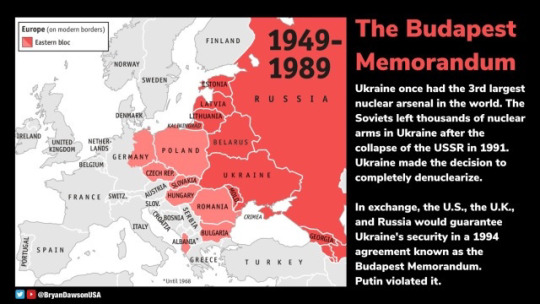
👉🏿 https://www.brookings.edu/blog/up-front/2014/11/06/did-nato-promise-not-to-enlarge-gorbachev-says-no/
👉🏿 https://www.tumblr.com/odinsblog/686191406300184576/appeasement-does-not-work-appeasement-didnt
👉🏿 https://www.tumblr.com/odinsblog/684530801484922880/believing-putins-reasons-for-invading-ukraine
👉🏿 https://www.tumblr.com/odinsblog/742088177664344064/violated-agreements-1991-russia-cosigns
#politics#ukraine#russia#dmytro kuleba#russian propaganda#nato#russian colonialism#nato expansion#russian imperialism#mikhail gorbachev#russia is a terrorist state#warsaw pact#russian expansion#russian fascism ☭#soviet union#tankies#vladimir putin is a war criminal#baltic states#🇺🇦
98 notes
·
View notes
Text
I too once danced in a ring. It was in 1948. In my country, the Communists had taken power, the Socialist and democratic Christian ministers had taken refuge abroad, and I took other Communist students by the hands or shoulders and we took two steps in place, one step forward, raised the left leg to one side and then the right to the other, and we did this nearly every month, because we always had something to celebrate, an anniversary or some other event, old injustices were redressed, new injustices were perpetrated, factories were nationalized, thousands of people went to prison, medical care was free, tobacconists saw their shops confiscated, aged workers vacationed for the first time in expropriated villas, and on our faces we had the smile of happiness. Then one day I said something I should not have said, was expelled from the party, and had to leave the ring dance.
That is when I understood the magical meaning of the circle. If you go away from a row, you can still come back into it. A row is an open formation. But a circle closes up, and if you go away from it, there is no way back. It is not by chance that the planets move in circles and that a rock coming loose from one of them goes inexorably away, carried off by centrifugal force. Like a meteorite broken off from a planet, I left the circle and have not yet stopped falling. Some people are granted their death as they are whirling around, and others are smashed at the end of their fall. And these others (I am one of them) always retain a kind of faint yearning for that lost ring dance, because we are all inhabitants of a universe where everything turns in circles.
It was God knows what anniversary and the streets of Prague were once again filled with young people dancing in rings. I wandered among them, I came very close to them, but I was forbidden to enter any of their rings. It was June 1950, and Milada Horakova had been hanged the day before. She had been a Socialist deputy and the Communist tribunal had accused her of plotting against the state. Zavis Kalandra, a Czech surrealist and a friend of Andre Breton and Paul Eluard, was hanged at the same time. And the dancing young Czechs, knowing that the day before, in the same city, a woman and a surrealist had been swinging from the end of ropes, were dancing all the more frenetically, because their dance was a demonstration of their innocence, in shining contrast to the guilty darkness of the two who were hanged, those betrayers of the people and its hopes.
Andre Breton did not believe Kalandra had betrayed the people and its hopes, and in Paris he called on Eluard (in an open letter dated June 13, 1950) to protest the insane accusation and try to save their old friend. But Eluard was busy dancing in a gigantic ring between Paris, Moscow, Prague, Warsaw, Sofia, and Greece, between all the socialist countries and all the world’s Communist parties, and everywhere he recited his beautiful poems about joy and brotherhood. After reading Breton’s letter, he took two steps in place, then one step forward, he shook his head, refusing to defend a betrayer of the people (in the June 19, 1950 issue of the weekly Action), and started to recite in a metallic voice:
“We shall fill innocence With the strength that so long We lacked We shall no longer be alone.”
I wandered through the streets of Prague, rings of laughing, dancing Czechs swirled around me, and I knew that I did not belong to them but belonged to Kalandra, who had also come loose from the circular trajectory and had fallen, fallen, to end his fall in a condemned man’s coffin, but even though I did not belong to them, I nonetheless watched the dancing with envy and yearning, unable to take my eyes off them. And that is when I saw him, right in front of me! He had his arms around their shoulders and along with them was singing two or three simple notes and raising his left leg to one side and then his right leg to the other. Yes, it was he, Prague’s darling Eluard! And suddenly the people he was dancing with fell silent, continuing to move in absolute silence while he chanted to the stamping of their feet:
“We shall flee rest we shall flee sleep, We shall outrun dawn and spring And we shall shape days and seasons To the measure of our dreams.”
And then everyone abruptly began again to sing the three or four simple notes, speeding up the steps of their dance. They were fleeing rest and sleep, outrunning time, and filling their innocence. They were all smiling, and Eluard leaned over a girl he had his arm around:
“A man possessed by peace is always smiling.”
And the girl started laughing and stamping her feet harder so that she rose a few centimeters above the pavement, pulling the others up after her, and a moment later not one of them was touching the ground, they were all taking two steps in place and one step forward without touching the ground, yes, they were soaring over Wenceslaus Square, their dancing ring resembled a great wreath flying off, and I ran on the ground below and looked up to see them, as they soared farther and farther away, raising the left leg to one side and then the right to the other, and there below them was Prague with its cafes full of poets and its prisons full of betrayers of the people, and from the crematorium where they were incinerating a Socialist deputy and a surrealist writer the smoke ascended to the heavens like a good omen, and I heard Eluard’s metallic voice:
“Love is at work, it is tireless.”
And I ran after that voice through the streets so as not to lose sight of the splendid wreath of bodies gliding over the city, and I realized with anguish in my heart that they were flying like birds and I was falling like a stone, that they had wings and I would never have any.
Milan Kundera, The Book of Laughter and Forgetting (tr. Aaron Asher)
#book that changed my whole shit on a molecular level when i was 15 and 17 and 20 and 22 and 27 etc. etc.#milan kundera#the book of laughter and forgetting
47 notes
·
View notes
Text

Self-portrait 1896
Konstanty Gorski (Górski) (Polish painter) 1868-1934
Oil on canvas
Private Collection
Konstanty Górski (also known as Gorski) (born 1868 in Kazimierzów, died 1934 in Warsaw) - Polish painter.
He attended the Moscow School of Painting, Sculpture and Architecture
Konstanty Górski created portraits and caricatures, and rarely used historical and fairy-tale themes. He illustrated books and magazines, among others. Wędrowiec, He was an outstanding organizer of foreign painting exhibitions, for which he was awarded the Legion of Honor and the Cross of Merit awarded in Austria.
30 notes
·
View notes
Note
how many versions of cats were released on cd? I have the obc and olc versions so I was wondering if you knew what other versions there were, and if possible where to find them :D many thanks!
Hello Anon,
There are eighteen cast recordings:
Original London 1981 (both 2CD full recording and 1CD highlights)
Original Broadway 1982 (both 2CD full recording and 1CD highlights)
Vienna 1983 (1CD highlights)
Budapest 1984 (1CD highlights)*
Australia (Sydney) 1985 (2CD full recording)
Japan (Osaka) 1985 (2CD full recording)
Hamburg 1986 (2CD full recording)
Amsterdam 1987 (1CD highlights)
Paris 1989 (2CD full recording)
Japan (Nagoya) 1989 (2CD full recording)
Mexico 1991 (1CD highlights)
Warsaw 2004 (1CD highlights)*
Prague 2004 (1CD highlights)*
Dutch Tour 2006 (1CD highlights)
Italian Tour 2009 (1CD highlights)*
Japan (Tokyo) 2019 (2CD full recording)
2019 Movie (1CD highlights)
Vienna Revival 2021 (2CD full recording)
*Non-replica production, if that matters
In addition, there are a number of promo CDs that include a handful of tracks from the casts at the time of release:
Hamburg 1996 (3 track promo, assuming audio taken from 1986 cast recording)
Japan (Tokyo) 1996 (3 track promo)
CATS 1998 Elaine Paige (3 track promo; 'Memory' included, and two other non-CATS songs)
Japan (Osaka) 2001 (4 track promo)
Madrid 2003 (1 track 'Memory' promo)
Moscow 2005 (8 track promo?, two versions; both have 4 instrumental tracks)
Dutch Tour 2006 (3 track promo, audio from 2006 cast recording)
German Tent Tour 2011 (3 track promo)
Of everything listed above, the only ones I do not own are the Madrid 2003 'Memory' promo, Prague 2004 cast recording (a very rare CD that was scrapped before moving to production, only test/promo copies exist), and Moscow 2005 (another very rare promo release, only found with the press packages). Who knows if I can ever get my hands on them.
In terms of where to find them, the OLC, OBC, and Vienna 1983 are still being produced today and can be easily found new online, through Amazon or eBay (or better yet, in-person at your local music store!), and so is the Budapest 1984 CD as well (at least from what I can tell, it is always readily available brand new from Hungary). The 1989 and 2019 Japanese cast recordings are also still readily available brand new from Japan through the Shiki webstore. The 2019 movie highlights is also very easy to find, considering it just was released. The Vienna 2021 recording is still available from the label's website (at 45% right now!), but they only ship within Europe.
All the others can be found second-hand to varying degrees of ease online (i.e., eBay). The 1980s cast recordings are not too difficult, with Hamburg being fairly easily found, but as you start moving into lesser known (and shorter running) productions, it becomes more difficult to find them. Some are extremely uncommon, and I purchased the only copy I have even seen go for sale throughout the years, and I am still waiting for the chance to get the few I do not have.
Happy hunting to you, Anon!
32 notes
·
View notes
Text
Ukraine is outraged by the unwavering American support for Israel, calling it a "double standard" as the United States refuses to intercept Russian missiles and drones over Ukraine, Politico reported on Oct. 16.
This week, the United States deployed the advanced THAAD missile defense system to protect Israel from Iranian ballistic missiles. However, Ukraine receives no similar level of assistance despite facing daily attacks from Russian drones, missiles, and bombs, the article states.
The reason for this discrepancy is that Russia possesses nuclear weapons, making Washington wary of escalating tensions with Moscow.
"The tough answer that Ukrainians may not like to hear but is unfortunately true is that we can take the risk of shooting down Iranian missiles over Israel without triggering direct war with Tehran that could lead to nuclear war," a high-ranking U.S. Senate aide working on Ukraine policy told Politico.
“There’s a lot more risk in trying that with Russia.”
Two officials from the Biden administration confirmed this. The White House fears that sending U.S. troops to Ukraine to intercept Russian missiles could provoke a direct military confrontation between the two leading nuclear powers, with potentially apocalyptic consequences.
"It is sad to look at all this as an ordinary citizen of Ukraine — when in an agreement to prevent escalation on the part of Moscow, your country and citizens are being sacrificed," said Mykola Bielieskov, a research fellow at the Ukrainian National Institute for Strategic Studies.
Kyiv wants Poland and Romania to help intercept Russian targets over western Ukraine. This option is being discussed, but the countries have not changed their policies yet, Politico writes. Warsaw has stated that it will not act without full NATO alliance support.
Meanwhile, two Ukrainian air defense officers, speaking on condition of anonymity, explained that it is easier for the United States to defend Israel's skies because it is a small country, and America can use ship-based air defense systems. In contrast, Ukraine is vast and inaccessible to Western fleets; its allies would need to place air defense systems on the country's western border, from which they could only protect adjacent territory.
"NATO members entering into the aerial defense of Ukraine would need to bring a much larger contribution, over a broader area, with a greater risk of ‘entering the war’ for uncertain gains," said Matthew Savill, military sciences director at the Royal United Services Institute in London.
“The cost would also be greater, as the frequency of Russian attacks is far greater than the significant but reactive Iranian attempts to strike Israel directly.”
However, Ukraine's frustration is growing as the Biden administration is not doing enough to help Kyiv stop Russian attacks, Politico notes. This includes slow weapons deliveries and a ban on using long-range missiles to strike Russian territory.
According to the outlet, U.S. officials are aware of Kyiv's growing dissatisfaction. They stated that they are working on new weapons supplies, which they hope will address the outrage.
Defense Secretary Lloyd Austin authorized on Oct. 13 the deployment of a THAAD battery and associated U.S. military personnel to bolster Israel's air defense following Iranian attacks on April 13 and Oct. 1.
Pentagon spokesperson Sabrina Singh said on Oct. 15 that the United States will not intercept missiles over Ukraine as it does over Israel because "the wars are different."
29 notes
·
View notes
Text
Stalin’s radio speech seems to have reached all Europe on the day that it was delivered. In spite of German attempts to suppress it, it was posted and circulated in all the oppressed lands. Many letters of acknowledgment reached Moscow from Bulgaria. In Serbia and Croatia, the statement that the Red Army was fighting for all Europeans enslaved by fascism was especially stressed. The people of Carpathian Ukraine – the eastern tip of Czechoslovakia given by Hitler to Hungary – organized guerrillas, attacked the German airdromes on their territory and claimed to have destroyed 27 German planes, large quantities of gasoline, and many trains loaded with German troops. They sent a report about it to Moscow and added: “We consider our country as one of those territories referred to by Stalin as ‘temporarily occupied’.” How the people in Poland learned of the Soviet-Polish alliance signed in London is unknown. The German press did not mention it and death was the penalty for listening to a foreign broadcast. But the day after the agreement was signed, the body of a commander of a Nazi Storm detachment was found in the street in Lodz. On his chest a note was pinned by a dagger reading: “The Soviet-Polish Treaty has entered into force.” Long before any actual Polish battalions could be organized in the U.S.S.R. to fight at the front, guerrilla actions spread widely through Poland itself. Soviet planes are reported to be dropping ammunition to thousands of armed Polish soldiers who had been hiding in the forests and swamps for nearly two years. A manifesto from Poland smuggled to London disclosed that more than two thousand organized groups were carrying on active opposition to the Nazi war machine. Thirteen illegal Polish daily newspapers keep the population informed about their activities. Through these channels the appeal issued by the Moscow “Rally of Slav Peoples” was posted in Warsaw and Cracow and circulated throughout the villages only a few hours after it was made. This rally appealed for unity of all the Slav peoples against Hitler, a unity based on the equality of Slav nations and not on the old Pan-Slav concept of Russian dominance.
The Soviets Expected It, Anna Louise Strong, 1941
28 notes
·
View notes
Text
Just remembered that there is a Polish version of the Metro universe and it's really funny because like, if you have ever heard anything about the original series you know that it takes place in the Moscow metro, which is gigantic and pretty fucking complicated
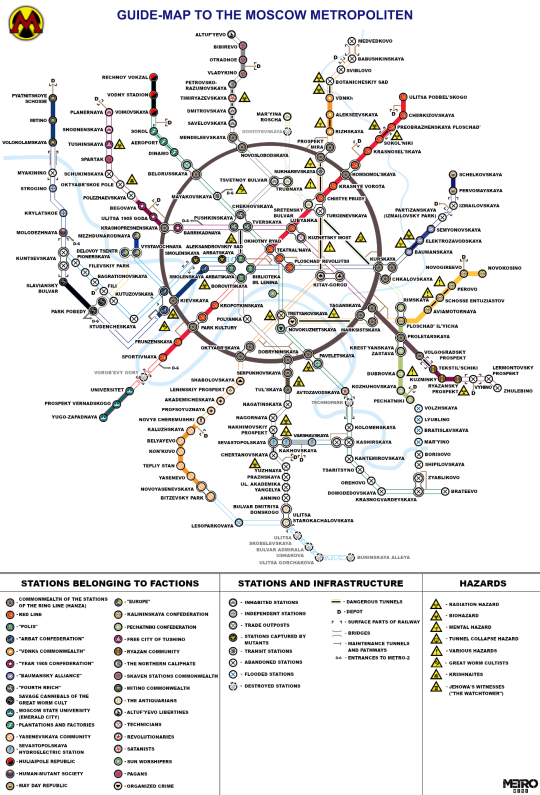
Every time I'm rereading these books and the name of the station pops up I search for it on the map to place it somewhere and I can never remember which stations are supposed to be next to each other, even after a dozen readthroughs. It's a fantastic, complex setting which gives the author so many opportunities to put cool shit in this world.
Now, there is a book series in Poland where the concept is the same as in Glukhovsky's books, but it takes place in the Warsaw metro. And the contrast between the two is so funny.
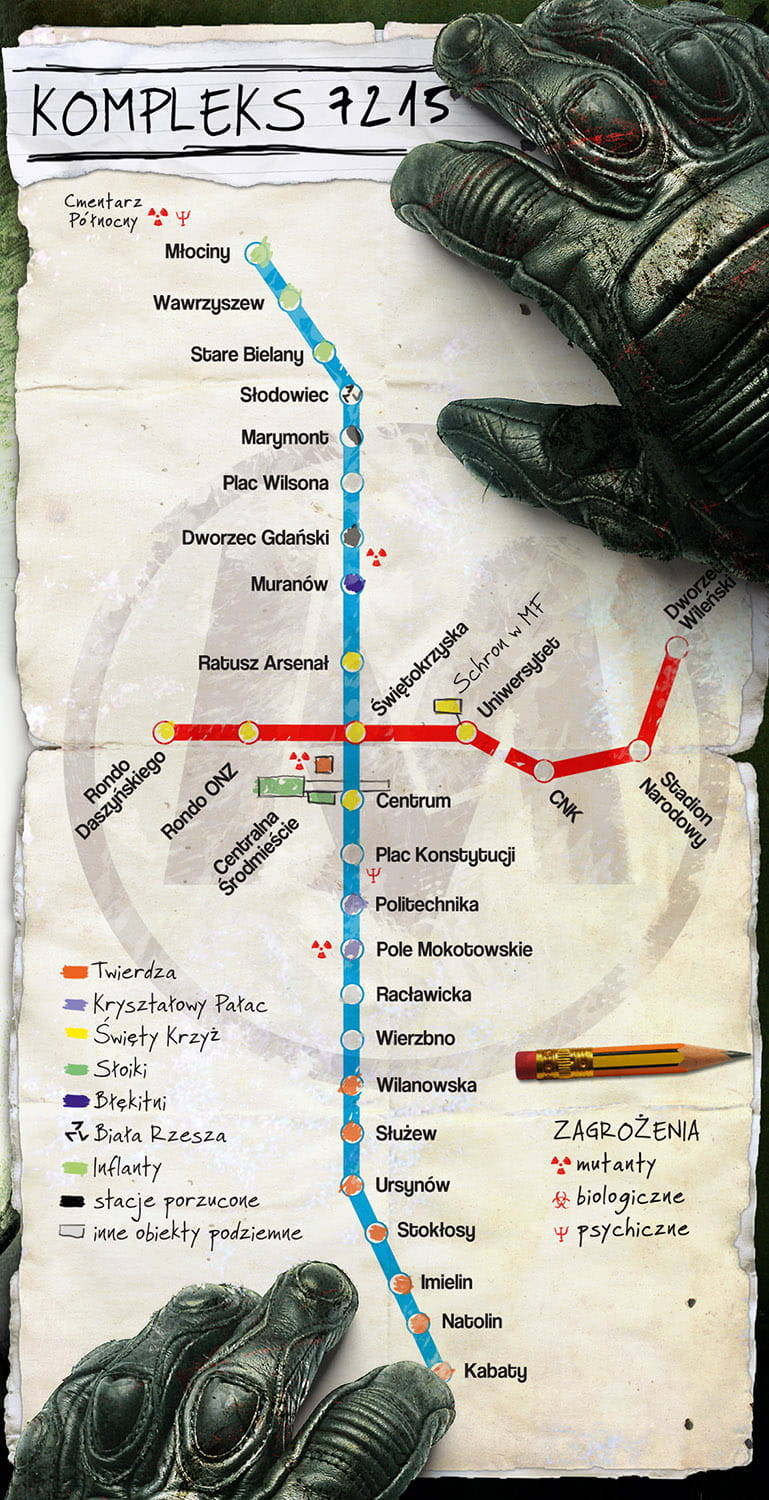
It's so tinyyyy. I loved these books as a kid and I read them years before the original series, but compared to the Moscow metro this is just like a younger sibling copying the older one in an adorable way
#also i will never forgive them for not doing anything with marymont since it already looks like a YA postapocalyptic setting#metro#metro 2033
48 notes
·
View notes